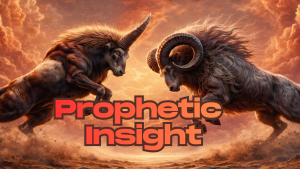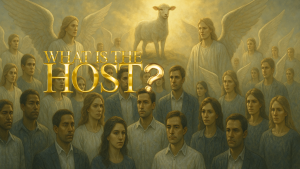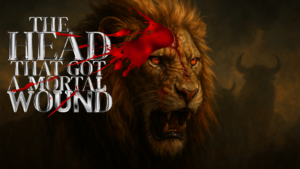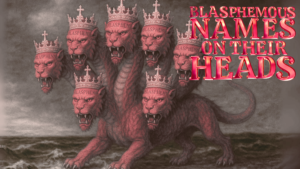Last updated on July 25, 2025
When the Bible mentions Greece in prophecy, most people immediately assume it refers exclusively to the ancient Greek empire, particularly the one led by Alexander the Great. This assumption has shaped many traditional interpretations, where readers and scholars rely heavily on historical accounts to make sense of prophetic passages. They look at how Alexander swiftly conquered much of the known world, how his kingdom was later divided among his generals, and how these historical events seem to align with symbolic imagery found in books like Daniel and Revelation. Because of this, many believers have been conditioned to interpret every reference to Greece through the lens of what has already happened in the past.
However, we must ask ourselves: Is history the only perspective from which we can interpret prophetic references to Greece? Could these references hold deeper layers of meaning that go beyond ancient military victories and political narratives? It is crucial to recognize that biblical prophecy often operates on multiple levels. While it may speak of specific historical events, it also reveals spiritual patterns, symbolic truths, and future fulfillments. In this way, historical events serve as shadows or foreshadowings of greater spiritual realities that are yet to be unveiled.
In that light, we should remain open to the possibility that Greece in prophecy may represent more than just a fallen empire of the past—it might symbolize a modern ideological system, a cultural legacy, or even a spiritual stronghold that continues to shape world affairs today. Interpreting prophecy in this broader way allows us to see not just what was, but what is and what is to come.
Spiritual Lens
Those who have followed this ministry for some time know that we interpret the world—especially biblical prophecy—through a spiritual lens. We do not merely focus on the outward, historical facts, but instead seek to understand the deeper spiritual realities at work behind them. This approach extends to how we view Greece. We do not simply see Greece as an ancient empire that rose and fell in the past. Rather, we recognize that the influence of Greece has evolved and continues to operate in the world today—not just as a geopolitical entity, but as a spiritual force that still shapes the mindset of nations and peoples.
We believe that the spirit of Greece did not vanish with the collapse of its empire. Instead, it transformed and adapted, continuing its work in a different form. Through spiritual discernment, we identify this evolving influence and recognize it as a spirit. More specifically, we discern that the dominant feature of the Greek legacy—democracy—is what defines the spirit of Greece in our time. Among all of Greece’s contributions to human civilization—philosophy, arts, science, and politics—democracy stands out as the most enduring and far-reaching. Because of this, we understand the spirit of Greece to manifest primarily through the system of democratic governance, which remains deeply embedded in modern societies around the world. Democracy, as we now know it, is more than just a form of government—it is an ideological framework that shapes how people think, behave, and interact. And in this light, we see that the spirit of Greece is very much alive and influential in our present age.
Greece as democracy
Let us now examine several biblical prophecies that mention Greece and interpret them through the lens of our spiritual understanding—specifically, with the awareness that democracy now represents the realm of Greece. Rather than limiting our interpretation to the ancient nation-state that once rose to power under Alexander the Great, we approach these prophetic references with the discernment that Greece has evolved into a spiritual system. This system manifests today in the form of democracy, a form of governance that has deeply influenced the modern world. With this in mind, we begin to see these prophecies not as records of events confined to the past, but as living words pointing to ongoing spiritual realities.
As we analyze the role of Greece in prophetic texts, we must keep in view that democracy—as the most influential legacy of the Greek empire—continues to spread its ideals globally. These ideals promote human authority, popular rule, and individual autonomy, often in ways that subtly challenge or even oppose the sovereignty of God. By recognizing democracy as the modern embodiment of the Greek spirit, we can begin to uncover how these prophecies are unfolding today and how they align with the broader spiritual conflict between the kingdom of God and the systems of this world.
The Third Kingdom
Daniel chapter two, chapter seven, and chapter eight reveal a clear understanding that Greece is the third kingdom destined to rule the world in the prophetic timeline. These chapters present a progression of empires, each rising and falling according to divine purpose, and Greece appears consistently as the third in this sequence. Through the imagery of the bronze belly and thighs in Daniel 2, the four-headed leopard in Daniel 7, and the male goat in Daniel 8, the Scriptures identify Greece as the next world power following Medo-Persia. This consistent placement confirms that Greece held a significant role in the unfolding of God’s prophetic plan concerning earthly kingdoms.
Daniel 7:6 “Next, as I watched, suddenly another beast appeared. It was like a leopard, and on its back it had four wings like those of a bird. The beast also had four heads, and it was given authority to rule.”
Daniel 2:39 But after you, there will arise another kingdom, inferior to yours. Next, a third kingdom, one of bronze, will rule the whole earth.
Daniel 8:19-22 And he said, “Look, I am making known to you what shall happen in the latter time of the indignation; for at the appointed time the end shall be. The ram which you saw, having the two horns—they are the kings of Media and Persia. And the male goat is the kingdom of Greece. The large horn that is between its eyes is the first king. As for the broken horn and the four that stood up in its place, four kingdoms shall arise out of that nation, but not with its power.“
By examining these verses closely, we can clearly discern that the third kingdom mentioned in the prophetic sequence refers to Greece. This understanding aligns with both historical context and scriptural interpretation. However, when we move beyond a purely historical view and begin to look through a spiritual lens, our perception of Greece changes significantly. We no longer see it merely as an ancient empire that conquered lands and expanded borders. Instead, we recognize Greece as a spiritual force—one that has continued to exert influence long after its physical kingdom disappeared from the world stage.
Moreover, as we apply spiritual discernment to this understanding, we begin to identify the most enduring and transformative legacy of Greece: democracy. Democracy, as a system of government birthed and developed in ancient Greece, continues to shape political systems and social ideologies across the globe. This enduring influence allows us to see that the spirit of Greece is not dead—it has evolved and taken root in modern forms of governance. Therefore, through this spiritual lens, we identify the spirit of democracy as the present-day manifestation of the kingdom of Greece. This spirit promotes rule by the will of the people, often emphasizing human reasoning and collective decision-making over divine authority. In this way, democracy, though widely accepted and praised by the world, can be discerned spiritually as a force that rivals God’s kingdom and subtly opposes His rule.
The Beast From The Sea
When we begin to understand Greece as more than just an ancient empire—and instead recognize it as the spirit of democracy—we can revisit other prophecies in the Bible with deeper spiritual insight. One such prophecy appears in the Book of Revelation, where the Apostle John describes a mysterious and dreadful beast from the sea.
Revelation 13:1–2 “Then I stood on the sand of the sea. And I saw a beast rising up out of the sea, having seven heads and ten horns, and on his horns ten crowns, and on his heads a blasphemous name. Now the beast which I saw was like a leopard, his feet were like the feet of a bear, and his mouth like the mouth of a lion.”
The leopard in this prophecy, as we understand, represents Greece. Therefore, when the beast from the sea appears, it will take on the likeness of democracy. It will seem to promote freedom, equality, and human rights, but beneath the surface, it will serve as a spiritual tool for control and deception. I have written separate posts that explore the symbolism behind the mouth of a lion and the feet of a bear in more detail. These elements each represent other ruling powers and spiritual influences that converge within this final system of global governance. Click the links to read more and gain a fuller understanding of the prophetic picture.
Greece vs. Zion
Another key prophecy that mentions Greece can be found in the Book of the Prophet Zechariah, offering deeper insight into the spiritual conflict between the kingdom of God and the systems of this world.
Zechariah 9:13
“For I have bent Judah, My bow, Fitted the bow with Ephraim, And raised up your sons, O Zion, Against your sons, O Greece, And made you like the sword of a mighty man.”
In this prophecy, God declares that He will stir up the sons of Zion—those who belong to His kingdom—and set them in opposition to the sons of Greece. When viewed through a spiritual lens, this is not just a reference to ancient nations, but to two opposing systems: Zion represents God’s kingdom on earth, while Greece symbolizes the spirit of democracy and human governance. The “sons of Greece” are the nations and peoples aligned with democratic ideologies, which often exalt the will of man over the sovereignty of God. In contrast, the “sons of Zion” are those who submit to divine authority and walk according to the principles of God’s eternal rule.
This conflict between Zion and Greece mirrors a greater prophetic theme found throughout Scripture—the eventual overthrow of all human authority by Christ. As stated in 1 Corinthians 15:24, “Then the end will come, when He hands over the kingdom to God the Father after He has destroyed all dominion, authority and power.” This confirms that every man-made system, including the spiritual influence of Greece, will be brought to nothing under Christ’s rule. Ultimately, God will establish His kingdom in full, and the authority of Zion will triumph over the systems of this world.
Conclusion
In light of the prophetic scriptures and spiritual discernment, it becomes evident that Greece in Bible prophecy is more than just a historical empire—it is a spiritual symbol that continues to manifest in modern times through the system of democracy. While ancient Greece rose and fell as a world power, its legacy, particularly the ideology of rule by the people, lives on. Through democracy, the spirit of Greece still influences nations, shaping global governance with ideals that often place human will above divine authority.
When we interpret prophecies such as those found in Daniel, Zechariah, and Revelation, we begin to see that Greece—as a spiritual force—remains relevant in the unfolding of God’s plan. The leopard-like features of the beast, the confrontation between Zion and Greece, and the prophesied end of all worldly dominions point to a spiritual clash between the kingdom of God and the systems built by man. Democracy, though praised for its freedoms and ideals, can serve as a subtle counterfeit to God’s theocratic rule, encouraging societies to exalt human reasoning while marginalizing the voice of God.
Therefore, as believers, we must view these prophetic patterns not just historically, but spiritually. We are called to discern the times, to recognize the influence of Greece in the modern world, and to stand as sons and daughters of Zion—loyal to God’s kingdom and prepared to resist systems that elevate man above the Lord. In the end, Christ will bring every dominion, authority, and power under His feet, and the kingdom will be handed over to God the Father. Until then, we watch, we discern, and we remain faithful to the truth.







Be First to Comment